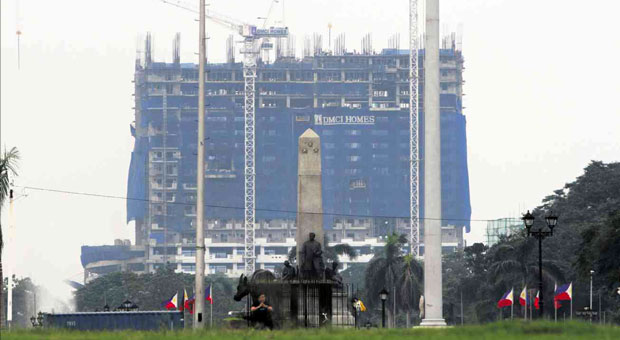
RIZAL IN CONDO’S SHADOW The construction of the Torre de Manila, which mars the view of the Rizal Monument in Manila, continues despite calls from various groups to stop the building. INQUIRER FILE PHOTO / EDWIN BACASMAS
MANILA, Philippines—The Supreme Court has ordered the National Commission on Culture and the Arts (NCCA) to explain why it had ordered DMCI Homes to stop its construction of the controversial Torre de Manila condominium in Manila while there is still a pending petition in the tribunal against the project.
The court en banc issued the directive nearly a month after the NCCA, one of the intervenors in the SC case, apparently acted on its own and issued on Jan. 5 a cease and desist order (CDO) on the structure rising on Taft Avenue.
The Knights of Rizal, which called the project a desecration of the shrine dedicated to the national hero Dr. Jose Rizal, initiated legal action against DMCI in September last year, asking the high court to stop the construction and order the demolition of the floors so far built. The SC has yet to issue a temporary restraining order (TRO) sought by the petitioner.
In a press briefing on Tuesday, Supreme Court spokesperson Theodore Te said “the court noted various legal submissions made in this case, including the various comments made by the respondents and intervenors.”
“It also directed the intervenor-respondent NCCA to explain its issuance of a cease and desist order against the questioned structure, within 10 days from notice of resolution,” Te said.
Asked whether the court viewed the NCCA action as a move preempting the court’s deliberations on the Knights’ petition, Te said the high court sought the cultural agency’s explanation because it was already a party in the case.
“There are remedies being sought here. Remember, they [Knights] are asking for a TRO, which has not been issued. The order of the court is to comment on the petitions and the TRO. So I suppose because they are now part of the case, the court is now asking them about the action made in the course of being included in the case,” said Te.
In November, two months after the Knights went to the SC, the high court ordered the inclusion of the NCCA, the National Museum of the Philippines, the National Historical Commission of the Philippines (NHCP) and Manila city officials as intervenors in the case.
The Knights has since made several calls on the SC to finally issue a TRO, saying the building continues to rise each day.
The NCCA served the CDO, dated Jan. 5, on the Torre work site on Jan. 13. In its own hearing on Jan. 28, the agency was formally told that construction continued despite the order.
Sought for comment on the SC’s order, the NCCA prosecutor on the Torre issue maintained that the agency’s action was “not inconsistent” with the pending SC petition.
“Because the Supreme Court converted the case from injunction to mandamus and then required the cultural agencies to comment, we surmised that the reason for doing so is that the court believes that it is the cultural agencies that have the power to address this specific kind of situation,” lawyer Trixie Angeles said in an Inquirer interview.
According to the lawyer, the NHCP and the National Museum have authorized the NCCA to handle all the cases concerning cultural properties that are not declared or marked as such by the two agencies.
“There are cultural properties (still without NHCP markers) that are deemed important by virtue of age, technological advancement and design or if it’s a work of a national artist. The presumption can be lifted or upheld and it’s the NCCA that does it,” Angeles said.
In Torre’s case, the presumption is that “landscapes are part of a cultural property,” she said. “The issuance of the CDO is just to make the construction stop long enough so that we can determine if the property is important enough to save. It’s just a presumption right now. If it’s not important, we will lift the CDO.”
“So DMCI has an opportunity to present its case to the NCCA,” Angeles added.
Torre has been under fire since 2012 for supposedly marring the view of the Rizal Monument. The 49-story condo project was approved by the Manila city government under then Mayor Alfredo Lim. It came under scrutiny in the city council under incumbent Mayor Joseph Estrada before it was given the approval to proceed.
The controversy has since led to Senate and House inquiries.
RELATED STORIES
Order to stop Torre de Manila construction lauded
Torre de Manila splits heritage sector

